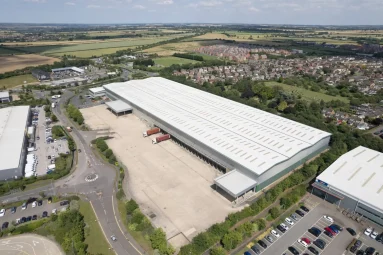
Trends for a Digital Economy
A new organisation called The Ideas Network 2030 was launched in Oxford recently to look at some of the trends that will emerge over the next decade. Here, Frank Nigriello, one of the founder members of IN2030, discusses the potential impact of digital technology on the business landscape of the future.
Written by: Frank Nigriello, Director of Corporate Affairs, Unipart Group
Many businesses today are concerned about the impact of digital technologies on the economy. In particular, business people may be trying to plot a route map for their own businesses while considering the external impact that the digital economy has on their future decisions.
That’s not surprising. Thomas Friedman in his book Thank You for Being Late described the pace of technological change as accelerating faster than our ability to adapt.
Although many companies are striving for digital transformation, there are significant barriers. In a recent YouGov poll, almost half of respondents believed UK businesses will be digitally transformed within the next three to 10 years. But up to a third of workers in small companies fear their companies will not ready.
So what does it take to be ready for digital? Most businesses that have begun the journey recognise that the change required is far greater than implementing technology. It requires new ecosystems, relationships and business models that optimise the value created using digital technologies.
But it is not enough to master one field of technology. It is critically important to understand “convergence” or the benefits gained from integrating technologies like artificial intelligence, robotics, and virtual reality to deliver greater value for the customer or to eliminate waste in an organisation.
There are three trends that have far reaching implications for an emerging digital economy. Recognising their significance may provide additional opportunities or help to avoid threats.
The first is the data driven economy. A cliché that has emerged in the past few years is that data is the new oil. That clearly is not a valid analogy as oil is finite and data is not.
Data, unlike other resources, is not hard to move, it becomes more useful the more it is used, and has more varieties than other resources; for instance pictures, words, sounds and moving images.
We’ve just spent a good deal of time worrying about how personal data is managed and stored thanks to GDPR. That thinking is already extending to other forms of data. Concerns about data and its management have led to calls for increased regulation.
So far, the EU has been the regulatory superpower in the digital space. The US by contrast has been moving in the opposite direction over cross border data flows and rolling back net neutrality.
Global regulation of data and its use will become more important. For instance, antitrust authorities may no longer focus on size of organisations alone, they may consider the breadth of a company’s data assets. Even relatively small companies may control vast data assets. Facebook, for instance, in 2006 had only150 employees but already ‘owned’ a considerable amount of user data.
Data also is not confined by geographies. If data becomes a currency rather than a representative form of currency, data credits can be exchanged for other resources – like goods and services. Forms of data may be more valuable than physical items as data can be whizzed into a 3D printer and result in physical products being produced anywhere at very low cost.
Global borders may be less relevant as the commoditisation of data is not impacted by traditional physical boundaries like mountains and rivers. That means that a fundamental aspect of our global economy – national and physical borders – could change accordingly. Borders today differentiate between public and private, they define nations and identity. What happens if they erode? You may be able to draw a line in the sand, but it’s hard to draw lines in the cloud.
A second trend is the automation of nearly everything. As with data, automation is likely to become far more pervasive as machines exchange data with each other and with their users.
This is not just about moving physical items, it includes human machine interface, artificial intelligence, machine learning and much more. Automated decision structures such as artificial intelligence have also raised questions about ethics. Oxford Brookes is currently engaged in developing new thinking around this complex area.
Predictions are that automation will have an impact on over two thirds of jobs that exist today.
Depending on what you read, automation will either create or destroy jobs or, in some cases, both. Siemens’ new automated plant in Yorkshire, for instance, is expected to create some 1,000 new jobs and 1,700 additional jobs in the supply chain. Meanwhile automation is seen to be displacing people in other organisations in roles like sales, customer service and professional services.
Automation will also have a direct impact on skills. As we change the way we work, we will change the way we prepare to work and even how we define work. Learning today is still largely the focus of only a quarter of a person’s life.
We may need to think differently about the need for self-created learning – wisdom and knowledge that is codified through experience – and the way in which we can architect learning to deliver not just skills, but the ability to manage change, risk and ambiguity.
We may find that we need to know less, but need to be able to find out or access knowledge faster. But how will we be sure the knowledge that we access is valid? Just Google that question and you get 70 million results. They can’t all be valid.
It’s estimated that by 2025, nearly half the workforce will be freelance and part of the gig economy. Many companies are now considering their organisational structures to plan the right operating models for the future.
In a society in which the ‘haves and have nots’ are increasingly polarised, the game may change significantly.
Insurers, lawyers, and accountants may find themselves replaced by artificial intelligence, which can be used effectively for large elements of rules-based systems.
Similarly, software developers, who are at a premium today, may also find themselves replaced by programming packages that are as easy to use as PowerPoint, requiring no specialist skill other than creativity. We may find that we can automate processes on the fly by simply asking the future Alexa or Siri to connect devices to work together.
Conversely, tradesmen and those delivering personal services are likely to be in higher demand; it is unlikely that a robot will fix your plumbing, cut your hair or deliver care to those who need it. But how are we developing those skills for the future in our current educational systems?
The third factor that impacts global economics and local decision making is the way we measure and value growth. GDP, the measure of national income, has been a trusty yardstick for giving us a view on growth in the past.
But in a world in which borders have become less important, people have become more adaptable, and technology plays a stronger role in decision making, those who evaluate economics based on GDP may need to think again. Those who value companies based on quarterly results may face the same issues.
Our digital economy could be based on value to society rather than absolute growth of goods and services sold. Creativity, rather than capital, may determine those organisations that are the new wealth creators, and investment yardsticks may be forced to extend to intangible assets like culture.
Ironically perhaps, in a digital future, the way we assess value may be incompatible with the values that we hold and the factors that drive innovation.
Understanding the impact of these global changes on a local basis could significantly influence the way in which we plan our services, our connections and the way we invest in developing talent for the future.
Frank Nigriello is one of the founders of The Ideas Network 2030. For more information please visit the website: http://ideasnetwork2030.com/
More in Manufacturing

Intertronics: Driving Innovation in Adhesives and Assembly Solutions
For over four decades, Intertronics has been at the forefront of providing high-performance adhesives, coatings, sealants, and application equipment to industries that demand precision and reliability. From electronics and medical devices to automotive and aerospace, Intertronics’ expertise ensures that manufacturers can optimise their bonding and assembly processes with cutting-edge solutions.

Unipart named CCS supplier
Unipart has been named as a supplier on Crown Commercial Service’s (CCS) Logistics, Warehousing and Supply Chain Solutions (RM6329) framework agreement.

Owen Mumford: 70 Years of Innovation in Healthcare
Owen Mumford has been at the forefront of medical device innovation for over 70 years, pioneering solutions that enhance patient care and improve healthcare outcomes worldwide. Established in 1952 by Ivan Owen and John Mumford, the company has grown into a global leader in medical device design and manufacturing, with a commitment to quality, sustainability, and patient-centred innovation.
From this author

Unipart announces record performance for year ending 31 December 2024
Strong year of growth & expansion, celebrating 50 years of the Unipart brand

Unipart named CCS supplier
Unipart has been named as a supplier on Crown Commercial Service’s (CCS) Logistics, Warehousing and Supply Chain Solutions (RM6329) framework agreement.

Unipart partners GBUK
Unipart has formed a strategic partnership with GBUK

